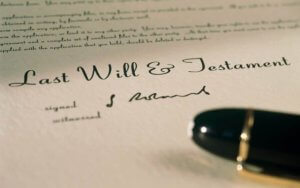- Wills & Succession Planning

Longer Reads
The implications of inheritance tax
Conservative MPs are campaigning to get rid of inheritance tax all together.
1 minute read
Published 13 October 2023
Key information
- Specialisms
- Private Wealth
- Services
- Wills & Succession Planning
Conservative MPs, led by former chancellor Nadhim Zahawi and former business secretary Jacob Rees-Mogg, are advocating for the abolition of inheritance tax in the UK. They argue that the freeze on the inheritance tax threshold, which has been fixed at £325,000 since 2009 and is set to continue until 2028, is bringing more estates into the tax band. The Conservative Growth Group, composed of more than 50 MPs, plans to publish a paper urging Chancellor Rishi Sunak to eliminate inheritance tax in the Autumn Statement.
Whilst the inheritance tax thresholds have been frozen, the interest charged by HMRC in respect of unpaid inheritance tax bills has more than doubled in the last year, rising to 7%. In stark comparison, the rate of interest paid by HMRC in relation to overpaid tax is only 3.5%. This high rate of interest may have contributed to HMRC’s record high inheritance tax collections of £7.1bn last year, and it is most likely to affect those estates where the main asset is the family home and where there is little else by way of liquid assets available to settle an inheritance tax liability.
Until inheritance tax is abolished or overhauled, one of the simplest and most effective ways to mitigate a liability is to give assets away during one’s lifetime. It is essential that the individual gifting assets must not retain an interest in the gifts, and it is important to ensure that the gifting will not affect the status quo regarding any standard of living. An individual may give away up to £3,000 each tax year without incurring inheritance tax (known as the annual exemption). It is also possible to gift up to £250 per person each tax year (known as the small gift allowance), as long as the recipients have not also benefited from the £3,000 annual exemption. There are additional gifting allowances available for weddings or civil partnerships, with the amount of the allowance being dependent on the relationship between the donor and the recipient.
It is possible to make large gifts in in excess of one’s annual exemptions and allowances. However, if the donor dies within seven years of making such a gift, its value will be included as part of the chargeable estate for inheritance tax purposes. In the event that an individual has surplus income, it may also be possible to make regular gifts free from inheritance tax using the exemption of normal expenditure out of income. For this exemption to apply, one must show that there is sufficient income left to maintain the usual standard of living after the gift has been made, and the pattern of gifting must be maintained over an indefinite period such that it can be classified as “normal”.
Another option would be to invest in assets which might attract business and/or agricultural relief. For instance, unlisted stocks and shares on the Alternative Investment Market, farms, and family businesses.
However, these reliefs are complicated, and several criteria must apply for them to be available on death.
Following the COVID-19 pandemic, the government has borrowed record high amounts. The government is clearly finding ways of servicing this debt by raising taxes. While Jeremy Hunt has promised to lower tax rates before the end of this Government’s term, the increasingly likely chance of Labour’s success and the possibility of an overhaul to inheritance tax has made now as good a time as any to review one’s estate plan.
This article was first published by Private Banker International on 12 October 2023.
For more information, please visit our Wills Lawyers page.
Related content
Longer Reads
The implications of inheritance tax
Conservative MPs are campaigning to get rid of inheritance tax all together.
Published 13 October 2023
Associated sectors / services
Authors
Conservative MPs, led by former chancellor Nadhim Zahawi and former business secretary Jacob Rees-Mogg, are advocating for the abolition of inheritance tax in the UK. They argue that the freeze on the inheritance tax threshold, which has been fixed at £325,000 since 2009 and is set to continue until 2028, is bringing more estates into the tax band. The Conservative Growth Group, composed of more than 50 MPs, plans to publish a paper urging Chancellor Rishi Sunak to eliminate inheritance tax in the Autumn Statement.
Whilst the inheritance tax thresholds have been frozen, the interest charged by HMRC in respect of unpaid inheritance tax bills has more than doubled in the last year, rising to 7%. In stark comparison, the rate of interest paid by HMRC in relation to overpaid tax is only 3.5%. This high rate of interest may have contributed to HMRC’s record high inheritance tax collections of £7.1bn last year, and it is most likely to affect those estates where the main asset is the family home and where there is little else by way of liquid assets available to settle an inheritance tax liability.
Until inheritance tax is abolished or overhauled, one of the simplest and most effective ways to mitigate a liability is to give assets away during one’s lifetime. It is essential that the individual gifting assets must not retain an interest in the gifts, and it is important to ensure that the gifting will not affect the status quo regarding any standard of living. An individual may give away up to £3,000 each tax year without incurring inheritance tax (known as the annual exemption). It is also possible to gift up to £250 per person each tax year (known as the small gift allowance), as long as the recipients have not also benefited from the £3,000 annual exemption. There are additional gifting allowances available for weddings or civil partnerships, with the amount of the allowance being dependent on the relationship between the donor and the recipient.
It is possible to make large gifts in in excess of one’s annual exemptions and allowances. However, if the donor dies within seven years of making such a gift, its value will be included as part of the chargeable estate for inheritance tax purposes. In the event that an individual has surplus income, it may also be possible to make regular gifts free from inheritance tax using the exemption of normal expenditure out of income. For this exemption to apply, one must show that there is sufficient income left to maintain the usual standard of living after the gift has been made, and the pattern of gifting must be maintained over an indefinite period such that it can be classified as “normal”.
Another option would be to invest in assets which might attract business and/or agricultural relief. For instance, unlisted stocks and shares on the Alternative Investment Market, farms, and family businesses.
However, these reliefs are complicated, and several criteria must apply for them to be available on death.
Following the COVID-19 pandemic, the government has borrowed record high amounts. The government is clearly finding ways of servicing this debt by raising taxes. While Jeremy Hunt has promised to lower tax rates before the end of this Government’s term, the increasingly likely chance of Labour’s success and the possibility of an overhaul to inheritance tax has made now as good a time as any to review one’s estate plan.
This article was first published by Private Banker International on 12 October 2023.
For more information, please visit our Wills Lawyers page.
Associated sectors / services
- Wills & Succession Planning
Authors
Need some more information? Make an enquiry below.
Subscribe
Please add your details and your areas of interest below
Article contributor
Cameron
CreesAssociate
Specialising in Digital, International trusts, tax & estate planning, Private wealth, UK trusts, tax & estate planning and Wills & succession planning
Enjoy reading our articles? why not subscribe to notifications so you’ll never miss one?
Subscribe to our articlesMessage us on WhatsApp (calling not available)
Please note that Collyer Bristow provides this service during office hours for general information and enquiries only and that no legal or other professional advice will be provided over the WhatsApp platform. Please also note that if you choose to use this platform your personal data is likely to be processed outside the UK and EEA, including in the US. Appropriate legal or other professional opinion should be taken before taking or omitting to take any action in respect of any specific problem. Collyer Bristow LLP accepts no liability for any loss or damage which may arise from reliance on information provided. All information will be deleted immediately upon completion of a conversation.
Close














































